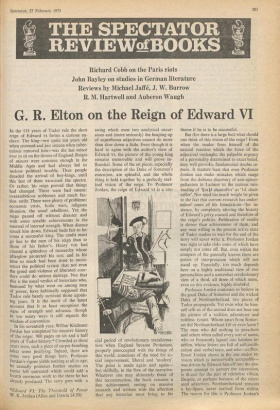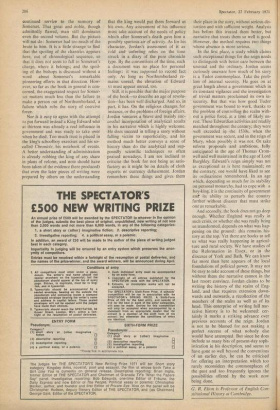THE SPEC'TATO REVIEWcd'BOOK
Richard Cobb on the Paris riots John Bayley on studies in German literature Reviews by Michael Jaffe, J. W. Burrow R. M. Hartwell and Auberon Waugh
G. R. Elton on the Reign of Edward VI
In the 118 years of Tudor rule the short reign of Edward vi forms a curious en- clave. The king—not quite ten years old when crowned and just sixteen when tuber- culosis removed him—was the last minor ever to sit on the throne of England.Reigns of minors were common enough in the Middle Ages and had always led to serious political trouble. Thus people dreaded the arrival of boy-kings, until this last of them exorcised the spectre. Or rather, his reign proved that things had changed. There were bad omens: overambitious noblemen and much fac- tion strife. There were plenty of problems: economic crisis, futile wars, religious disunion, the usual rebellions. Yet the reign passed off without disaster and with some notable achievements in the renewal of internal strength. When disease struck him down, Edward bade fair to be- come a successful king. The credit must go less to the men of his reign than to those of his father's. Henry viii had created a splendour of monarchy whose afterglow protected his son; and in his time so much had been done to recon- struct the political system that not even the greed and violence of liberated cour- tiers could do serious damage. Not that this is the usual verdict of historians who, bemused by what went on among men of power, have habitually supposed that Tudor rule barely survived those agonis- ing years. It is the merit of the latest account that it at least recognises the Signs of strength and advance, though in too many ways it still repeats the Wisdom of convention.
In his seventieth year, Wilbur Kitchener Jordan has completed his massive history of the reign: 900 pages on six and a half Years of Tudor history.* Crowded as those Years were, such a piece of carpet-bombing takes some justifying. Indeed, there are some very good things here. Professor Jordan's vigour yields nothing at all to age; he casually promises further studies on topics left untreated which could add a fourth enormous work to the three he has already produced. 'The story goes with a *Edward Vi: The Threshold of• Power W. K. Jordan (Allen and Unwin £4.50) swing which even two analytical excur- suses and (more seriously) the heaping up of superfluous adjectives cannot do more than slow down a little. Even though it is hard to agree with the author's view of Edward VI, the picture of the young king remains memorable and will prove in- fluential. Some of the set pieces, especially the description of the Duke of Somerset's execution, are splendid, and the whole thing is held together by a perfectly real- ised vision of the reign. To Professor Jordan, the reign of Edward vi is a cru- cial period of revolutionary, transforma- tion when England became Protestant, properly preoccupied With the things of this world, conscious of the need for so- cial improvement, liberal and 'modern'. The point is made again and again— but skilfully, in the flow of the narrative. Whatever one may ultimately think of this reconstruction, the book remains a fine achievement, resting on massive research and written with the affection that any historian must bring to his theme if he is to be successful. • But (for there is a large but) what should one think of this vision of the reign? Even when the reader frees himself of the natural reaction which the force of the adjectival onslaught, the palpable urgency of a personality determined to exact belief, may well provoke, fundamental doubts re- main. It matters least that even Professor Jordan can make mistakes which range from the dubious discovery of anti-episco- palianism in Latimer to the curious mis- reading of `I[orld chancellor' as 'Id. chan- cellor'. Nor need too much weight be given to the fact that current research has under- mined some of his foundations—for in- stance, by completely altering the history of Edward's privy council and therefore of the reign's politics. Publication of results is slower than achievement of them, and any man willing in the present active state of Tudor studies to wait for the end of the story will never write it. Professor Jordan was right to take risks some of which have simply not come off. But, even within the compass of the generally known there are points of interpretation which will not stand up. Especially, too much depends here on a highly traditional view of two personalities and a somewhat revolutionary view of a third, all three of which seem, even on this evidence, highly doubtful.
Professor Jordan continues to believe in the good Duke of Somerset and the wicked Duke of Northumberland, two pieces of Tudor propaganda. Yet even what he him- self tells us of the second does not bear out his picture of a reckless adventurer and ruthless tyrant. Whom apart from Somer- set did Northumberland kill or even harm? The man who did nothing to preachers and others when called every sort of name, who so frequently lapsed into helpless in- action, whose letters are full of self-justifi- cation and verbal tears, and who—as Pro- fessor Jordan shows in the one major re- vision which is unreservedly acceptable— was driven by Edward himself into the des- perate attempt to pervert the succession, is ill-cast for the part of relentless villain. Despite, or perhaps because, of the reiter- ated adjectives, Northumberland remains a lay-figure, never realised from within. The reason for this is Professor Jordan's continued service to the memory of Somerset. That great and noble, though admittedly flawed, man still dominates even the second volume. But the picture will not do: Somerset had too much of the brute in him. It is a little strange to find that the spoiling of the chantries appears here, out of chronological sequence, so that it does not seem to fall to Somerset's charge, where it belongs; and the spoil- ing of the bishops is discussed without a word about Somerset's remarkable pioneering efforts in that direction. How- ever, so far as the book in general is con- cerned, the exaggerated respect for Somer- set matters much less than the failure to make a person out of Northumberland, a failure which robs the story of coercive force.
Nor is it easy to agree with the attempt to put forward instead a King Edward who at thirteen was already a real influence in government and was ready to take aver when he died. Too much trust is placed in the king's schoolboy exercises and his so- called Chronicle, his notebook of events. A better understanding of administration is already robbing the king of any share in plans of reform, and note should have been taken of the evidence (here produced) that even the later pieces of writing were prepared by others on the understanding that the king would put them forward as his own. Any assessment of his influence must take account of the needs of policy which after Somerset's death gave him a possibly spurious air of activity. As for his character, Jordan's assessment of it as cold an& unfeeling relies on the tone struck in a diary of the pure chronicle type. By the conventions of the time, such a document was no place for personal feelings: it was supposed to record fact only. As long as Northumberland re- mains unreal, the elevation of Edward Vi must appear unreal, too.
Still, it is possible that the major purpose of the book—to describe an age of revolu- tion—has been well discharged. And so, in part, it has. On the religious changes, for instance, or the problems of foreign affairs, Jordan ventures a brave and mainly suc- cessful incorporation of analytical results in his narrative which is highly welcome.
• He does succeed in telling a story without falling victim to superficiality, and his method much better conveys a sense of history than do the analytical and sup- posedly scientific techniques so often praised nowadays. I am not inclined to criticise the book for not being as satis- factory as it might be on details of cloth exports or currency debasement. Jordan remembers these things and gives them their place in the story, without serious dis- tortion and with sufficient weight. Analysis has before this treated them better, but narrative that treats them so well is good. However, the method requires two things whose absence is more serious.
In the first place, a study which claims such exceptional things for the reign needs to distinguish with better care between the unusual and the ordinary. Jordan seems curiously unaware how much of his story is a Tudor commonplace. Take the prob- lem of internal security. He goes on at great length about a government which in its constant vigilance and the investigation of trivial matters proclaimed its own in- security. But that was how good Tudor government was bound to work, thanks to the problem of controlling the realm with- out a police force, at a time of likely un- rest. These Edwardian activities are readily matched throughout the century; they were well exceeded in -the 1530s, when the government was secure, and in the reign of Mary, when possibly it was not. Or take reform proposals and ambitions, fully anticipated in the age of Thomas Crom- well and well maintained in the age of Lord Burghley. Edward's reign simply was not as exceptional as is here maintained; on the contrary, one would have liked to see its ordinariness remembered. In an age which, depending so much for its stability on personal monarchy, had to cope with a boy-king. it is the continuity of government and its ability to perturb the country further without disaster that must strike one as remarkable.
And secondly, the book does not go deep enough. Whether England was really in such crisis, or whether she was really being so transformed, depends on what was hap- pening on the ground: this remains his- tory at.the top. Yet there are books to tell us what was really happening in agricul- 'Lure and rural society. We have studies of the Reformation in Essex, or in the dioceses of York and Bath. We can know far more than here appears of the local foundations of political power. It may not be easy to take account of these things, but without them the narrative cannot in the last resort convince. Jordan claims to be writing the history of the realm of Eng- land, and that requires extension down- wards and outwards, a recollection of the members of the realm as well as of its head. This enterprise of writing full nar- rative history is to be welcomed: cer- tainly it marks a striking advance over previous accounts of the reign. Jordan is not to be blamed for not making a perfect success of what nobody else would have attempted. But since he does include so many bits of present-day soph- istication in his description, and seems to have gone so well beyond the conventions of an earlier day, he can be criticised for offering an interpretation which too rarely reconsiders the commonplaces of the past and too frequently ignores the possibilities offered by the work now being done, G. R. Elton is Professor of English Con- stitutional History at Cambridge.



































 Previous page
Previous page